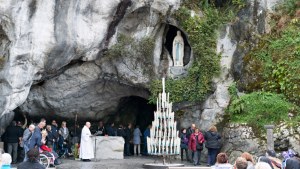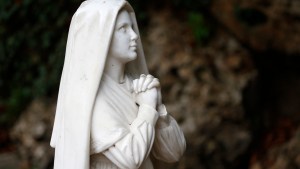The bishop of Tarbes and Lourdes, Jean-Marc Micas, was received by Pope Francis in late June at the Vatican Apostolic Palace. He was accompanied by Fr. Michel Daubanes, rector of the shrine at Lourdes. After two almost empty years due to the COVID-19 pandemic, the resumption of pilgrimages since 2022 has enabled the Marian shrine of Lourdes to gradually return to a normal rhythm. In an interview with I.MEDIA, Bishop Micas discusses the specific message conveyed by Lourdes in the context of the current political and social crisis.
Post-pandemic changes
After the difficult years marked by the pandemic, has the Lourdes shrine regained its momentum?
Bishop Jean-Marc Micas: Total attendance, at over three million pilgrims, is approaching the level of 2019, the last year before the COVID-19 pandemic. The recovery began in 2022, and the upward curve accelerated in 2023 and 2024, with a change in the profile of visitors and pilgrims. Europeans are still in the majority, but the number of pilgrims from the Americas and Asia is growing.
This is a new phenomenon, and these new pilgrims from the southern hemisphere don’t necessarily come during the usual pilgrimage period, from March to October. This poses new challenges for welcoming them, but it’s a good challenge that everyone is happy to take up.
We’re also seeing a reversal in the proportions between the number of individual pilgrims and organized pilgrimages. More and more people are coming spontaneously, which also presents us with new challenges in the face of the loss of religious and Christian identity in Europe. We need to develop new ways of welcoming these visitors, who may come to Lourdes with good intentions but who don’t necessarily have the cultural background to understand what they’re getting into.
We recently had a meeting with the people in charge to evaluate all these statistics. There are a lot of people and a good atmosphere in the shrine. Our host community, with its chaplains and lay staff, is finally smiling again, after the difficult period of COVID.

Lourdes, a place of unity
Society and the Church itself are very polarized… Is Lourdes a place that can help heal these fractures, by inviting people who may be politically or ideologically opposed to roll up their sleeves together in the service of the weakest?
Bishop Micas: Lourdes is a place that brings together people of all generations and sensibilities. With the chaplain in charge of liturgy, we know that there are many difficulties and tensions between Catholics in France, but here at Lourdes we are at the service of the whole universal Church, with a simple rule: the whole missal and nothing but the missal. We do what the Church asks us to do, and that doesn’t give rise to any particular tensions. Even the pilgrimage of the Society of St Pius X last October went off peacefully.
There are places where it’s much more tense and difficult, but it seems to me that Lourdes can serve as a real communion between different sensibilities. The whole world comes, including people of other religions. People meet and smile at each other. In this way, Lourdes is a successful project of humanity, for a few days or a few hours, at the foot of the Grotto.
As stated by the Second Vatican Council, the Church is at the service of universal brotherhood and the communion of men with each other and with God. These dimensions are brought to life during a pilgrimage to Lourdes, and we were happy to bear witness to them before the Holy Father.
The end-of-life debate
The sick and frail are the focus of attention at Lourdes, which offers some people their only outing and social occasion of the year. Is this in some way a prophetic message addressed to society as a whole, in the context of the debate on the end of life?
Bishop Micas: As I’ve often said, the Bishop of Lourdes is particularly concerned by this debate. With the criteria that are being proposed, perhaps a third or half of Lourdes pilgrims should already have disappeared! That’s just not possible! I can’t imagine a society that promotes that.
There are also all kinds of poverty at Lourdes: material poverty, but also psychological difficulties, which are at the heart of the activities of certain associations. Lourdes also welcomed 400 Ukrainian families. We were inspired to do this by Pope Francis, by his attention to migrants. The Gospel compels us, and we wonder about the compatibility of certain positions in the current election campaign with the Gospel ideal we serve and communicate.
The Holy Year
Will the Holy Year 2025 give rise to specific events in Lourdes?
Bishop Micas: The Jubilee is essentially held in Rome, but we have made a proposal to make Lourdes a stopover on the way to or from Rome. This will be a Jubilee year specifically for Lourdes too, as it will mark the centenary of the canonization of St. Bernadette, which will give rise to specific events in February.

Might Pope Francis visit Lourdes?
Bishop Micas: Naturally, I invited him to come… But he just smiled! The purpose of the meeting, which I had requested, was simply to introduce myself and to present him with an initial assessment of my episcopate, a little over two years after my appointment in March 2022.



